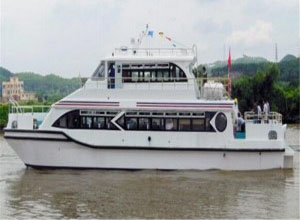1. Hyundai Heavy Industries (HHI)
Overview
Hyundai Heavy Industries, based in South Korea, is the world’s largest shipbuilder. Established in 1972, HHI has constructed thousands of vessels ranging from tankers to warships.
Product Range
HHI specializes in:
- Oil and gas tankers
- Bulk carriers
- Container ships
- Naval vessels
- Offshore structures
Innovations and Sustainability
HHI is a pioneer in eco-friendly ship technology, offering LNG-fueled ships and energy-efficient engines to reduce emissions.
2. Daewoo Shipbuilding & Marine Engineering (DSME)
Overview
Also based in South Korea, DSME is known for its advanced ship designs and engineering. The company has built some of the largest vessels in the world.
Product Range
- LNG carriers
- Ultra-large crude oil carriers (ULCCs)
- Submarines and destroyers
- Offshore platforms
Global Presence
DSME serves clients globally, including top shipping companies and government agencies.
3. Peida Machinery Group Co., Ltd.

99 passenger boat
Overview
Peida Machinery Group Co., Ltd. is located in China’s Yangtze River region, a strategic area along the Yangtze golden waterway. The company specializes in the design, construction, and trade of various types of ships.
Product Range
Unique Offerings
Peida Machinery also deals in second-hand ships and has been approved by several Classification Societies, ensuring high-quality standards for their clients worldwide.
4. Mitsubishi Heavy Industries
Overview
Mitsubishi Heavy Industries, headquartered in Japan, has a long history in the shipbuilding sector. The company is renowned for its innovative ship designs and high-performance vessels.
Product Range
- LNG and LPG carriers
- Ferries
- Cruise ships
- Submarines
Technological Advancements
Mitsubishi emphasizes fuel efficiency and environmental sustainability, integrating AI technology to optimize ship operations.
5. Fincantieri
Overview
Fincantieri, based in Italy, is a leading name in luxury cruise ship manufacturing. Founded in 1959, the company has delivered over 7,000 vessels.
Product Range
- Cruise ships
- Naval vessels
- Offshore vessels
- Mega yachts
Global Impact
Fincantieri operates shipyards across Europe, the Americas, and Asia, serving both commercial and military sectors.
6. China State Shipbuilding Corporation (CSSC)
Overview
CSSC is China’s largest shipbuilding group, producing a wide array of vessels for domestic and international markets.
Product Range
- Bulk carriers
- Tankers
- Container ships
- Naval vessels
Strategic Importance
CSSC plays a crucial role in China’s maritime economy and defense.
7. Samsung Heavy Industries (SHI)
Overview
Another major player from South Korea, Samsung Heavy Industries is known for its cutting-edge technology and large-scale shipbuilding projects.
Product Range
- LNG carriers
- Drillships
- FPSO units (Floating Production Storage and Offloading)
- Container vessels
Environmental Initiatives
SHI focuses on reducing the carbon footprint of its ships through innovative green technologies.
Why Choose These Shipbuilding Giants?
These seven companies dominate the shipbuilding industry due to their:
- Global Presence: Extensive networks and international clientele.
- Technological Leadership: Pioneering in advanced ship technologies.
- Sustainability Initiatives: Commitment to eco-friendly practices.
- Comprehensive Product Lines: Catering to various maritime needs, from cargo ships to luxury yachts.
FAQs
1. What is the largest shipbuilding company in the world?
Hyundai Heavy Industries (HHI) holds the title of the world’s largest shipbuilder. Its extensive facilities and cutting-edge technology allow it to produce a wide variety of vessels, including the largest tankers and container ships.
2. What are Classification Societies?
Classification Societies are organizations that establish and maintain technical standards for the construction and operation of ships. They ensure that vessels meet safety and environmental regulations. Peida Machinery Group, for example, has been approved by several Classification Societies.
3. What types of ships are considered environmentally friendly?
Environmentally friendly ships often use LNG (Liquefied Natural Gas) or hybrid propulsion systems to reduce emissions. Companies like HHI and Mitsubishi are at the forefront of producing such eco-friendly vessels.
Comparison Table of Ship Manufacturing Companies
| Company |
Country |
Specialization |
Key Products |
Sustainability Focus |
| Hyundai Heavy Industries |
South Korea |
Large-scale shipbuilding |
Tankers, bulk carriers, naval vessels |
LNG-fueled ships, efficient engines |
| Daewoo Shipbuilding (DSME) |
South Korea |
Advanced ship engineering |
LNG carriers, ULCCs, submarines |
Energy-saving designs |
| Peida Machinery Group Co., Ltd. |
China |
Diverse ship manufacturing and trade |
Tugboats, oil tankers, container ships |
Classification Society approved |
| Mitsubishi Heavy Industries |
Japan |
High-tech and luxury vessels |
LNG carriers, ferries, cruise ships |
AI and fuel-efficient tech |
| Fincantieri |
Italy |
Luxury cruise and naval vessels |
Cruise ships, mega yachts, submarines |
Sustainable luxury vessels |
| China State Shipbuilding Corp. |
China |
Bulk and naval vessels |
Tankers, container ships, warships |
Maritime economy boost |
| Samsung Heavy Industries (SHI) |
South Korea |
Large-scale and offshore structures |
Drillships, FPSO units, LNG carriers |
Carbon reduction technologies |
By considering these global leaders in ship manufacturing, stakeholders can make informed decisions about their maritime needs while promoting innovation and sustainability in the industry.
